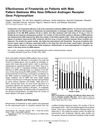 41 citations,
March 2012 in “Clinical and Experimental Dermatology”
41 citations,
March 2012 in “Clinical and Experimental Dermatology” G allele of AR Stul polymorphism linked to higher hair loss risk, especially in white people.
 12 citations,
October 2004 in “Experimental Gerontology”
12 citations,
October 2004 in “Experimental Gerontology” Changes in testosterone and estrogen receptor genes can affect how men age, influencing body fat, hair patterns, and possibly leading to skin disorders.
 11 citations,
January 2015 in “Journal of The European Academy of Dermatology and Venereology”
11 citations,
January 2015 in “Journal of The European Academy of Dermatology and Venereology” Hair loss gene linked to prostate issues.
 19 citations,
April 2014 in “Hormones”
19 citations,
April 2014 in “Hormones” Hormones and genetics play key roles in male and female baldness, which can affect mental health and may be linked to other health issues.
 23 citations,
January 2013 in “Indian Journal of Dermatology, Venereology and Leprology”
23 citations,
January 2013 in “Indian Journal of Dermatology, Venereology and Leprology” FPHL causes hair loss in women due to genetics and hormones; minoxidil and anti-androgens are treatments, and early intervention is advised.
 77 citations,
March 2001 in “Clinics in Dermatology”
77 citations,
March 2001 in “Clinics in Dermatology” Androgenetic alopecia involves genetics, hormones, and can be treated with medications or surgery.
 11 citations,
November 2012 in “Seminars in Cutaneous Medicine and Surgery”
11 citations,
November 2012 in “Seminars in Cutaneous Medicine and Surgery” Genetic factors affect hair loss, and molecular testing may help predict, diagnose, and treat it.
 47 citations,
July 2004 in “Journal of Dermatological Science”
47 citations,
July 2004 in “Journal of Dermatological Science” Hair loss in balding individuals is linked to changes in specific hair growth-related genes.
 60 citations,
January 2007 in “Human Genetics”
60 citations,
January 2007 in “Human Genetics” AR polyglycine repeat doesn't cause baldness.
 10 citations,
November 2010 in “Journal of Dermatology”
10 citations,
November 2010 in “Journal of Dermatology” Longer CAG repeats in gene linked to more severe hair loss in females.
 54 citations,
November 2001 in “Urology”
54 citations,
November 2001 in “Urology” The length of the CAG repeat in the androgen receptor gene affects the risk and progression of prostate cancer, BPH, infertility, and undermasculinized genitalia.
 51 citations,
January 2012 in “Annals of Dermatology”
51 citations,
January 2012 in “Annals of Dermatology” Asian hair loss differs from Europeans; consider individual needs and psychological well-being for treatment.
 41 citations,
August 2007 in “British Journal of Dermatology”
41 citations,
August 2007 in “British Journal of Dermatology” Men with Kennedy disease have less chance of hair loss.
 66 citations,
January 2001 in “Vitamins and hormones”
66 citations,
January 2001 in “Vitamins and hormones” Androgen receptors are key for development and health, affecting conditions like prostate cancer and male pattern baldness.
 53 citations,
January 2006 in “The Journal of clinical endocrinology and metabolism/Journal of clinical endocrinology & metabolism”
53 citations,
January 2006 in “The Journal of clinical endocrinology and metabolism/Journal of clinical endocrinology & metabolism” Reduced AR gene methylation may cause early pubic hair growth in girls.
 8 citations,
July 2012 in “Cambridge University Press eBooks”
8 citations,
July 2012 in “Cambridge University Press eBooks” Androgens can both increase body hair and cause scalp hair loss.
24 citations,
January 2018 in “Indian Journal of Dermatology, Venereology and Leprology” Androgenetic alopecia is mainly caused by genetic factors and increased androgen activity, leading to hair follicle miniaturization.
 11 citations,
January 2001 in “Cambridge University Press eBooks”
11 citations,
January 2001 in “Cambridge University Press eBooks” Androgens can cause hair growth in some areas but hair loss on the scalp.
 10 citations,
January 2009 in “Elsevier eBooks”
10 citations,
January 2009 in “Elsevier eBooks” Hair growth is influenced by hormones and goes through different phases; androgens can both promote and inhibit hair growth depending on the body area.
 September 2023 in “Cureus”
September 2023 in “Cureus” Topical finasteride might be a good alternative for hair loss treatment with fewer side effects, but more research is needed.
 98 citations,
February 2007 in “Seminars in Cell & Developmental Biology”
98 citations,
February 2007 in “Seminars in Cell & Developmental Biology” Androgens can both stimulate and cause hair loss, and understanding their effects is key to treating hair disorders.
 1 citations,
January 2009 in “CRC Press eBooks”
1 citations,
January 2009 in “CRC Press eBooks” Finasteride increases hair count and improves hair growth with low risk of side effects.
 23 citations,
December 2005 in “Journal of Investigative Dermatology Symposium Proceedings”
23 citations,
December 2005 in “Journal of Investigative Dermatology Symposium Proceedings” Finasteride works better for baldness in people with shorter gene repeats.
 5 citations,
January 2016 in “Dermatology”
5 citations,
January 2016 in “Dermatology” No significant link between CAG repeat numbers and female pattern hair loss in Han Chinese population.
 23 citations,
January 2014 in “International Journal of Biological Sciences”
23 citations,
January 2014 in “International Journal of Biological Sciences” African American men with prostate cancer have more androgen receptor mutations, which may lead to more aggressive cancer compared to Caucasian American men.
 January 2009 in “Egyptian Journal of Medical Human Genetics”
January 2009 in “Egyptian Journal of Medical Human Genetics” The study suggests that a specific gene variation and higher gene activity are linked to increased baldness in Egyptian men.
 14 citations,
December 2016 in “Sexual Medicine”
14 citations,
December 2016 in “Sexual Medicine” Finasteride side effects in young men may be linked to specific gene variations.
1 citations,
January 2022 in “Springer eBooks”  May 2024 in “Indian Journal of Dermatology”
May 2024 in “Indian Journal of Dermatology” Androgenetic alopecia in men is genetic and linked to health issues like obesity and heart disease, with treatments including minoxidil, finasteride, and hair transplants.
1 citations,
January 2019 in “Journal of Research in Medical Sciences” Fewer GGC sequences in the androgen receptor gene improve finasteride treatment for hair loss.



























